Malta – the small pearl of the Mediterranean. If you are looking where to travel for a short break or a longer holiday, you can have a great time in Malta. Don’t miss these stunning beaches, crystal Mediterranean waters, old towns full of history, and vibrant party centers like Paceville, known for its lively nightlife. So, open the internet and buy your ticket to Malta! Meanwhile, I will guide you on how to get around Malta and what you need to know about the transport on the island.
Malta Quick Information
Malta is a European archipelago between Sicily and North Africa in the Mediterranean Sea. It consists of the islands of Malta, Gozo, and Comino. Malta has long historical influence from different conquerors and nations over time. From the Arabs through Sicily to Britain – all left a significant mark on the language and the country. In 1964, Malta became independent from British rule and began its self-development. Since 2004, it has been in the European Union, so it is easy for the Europeans to get there only with an ID card.
Map of Malta
The Language in Malta
The official languages are Maltese and English. Maltese, a unique blend of Arabic, English, and Italian, is a fascinating language to encounter. English is the most widely spoken language due to the island’s diverse population, and Italian, spoken by many Italian residents, adds to Malta’s linguistic charm.
“Money Heist”
Not actually, although Malta is not a cheap country. Prepare some Euro – how much it depends on your own (I recommend a minimum of 50 EUR daily for food, gifts, tickets, and attractions…). Still, Malta is a tourist country, and some goods and services are overpriced. But if you run out of money, there are change bureaus at Malta International Airport open 24 hours a day. International cards are accepted, and foreign currency can also be exchanged. Banks, Automated Teller Machines (ATMs), and exchange bureaus can be found all over the island. If you want to get money with lower taxes, you better use the ATMs of the official banks here – Bank of Valletta, HSBC, and APS.
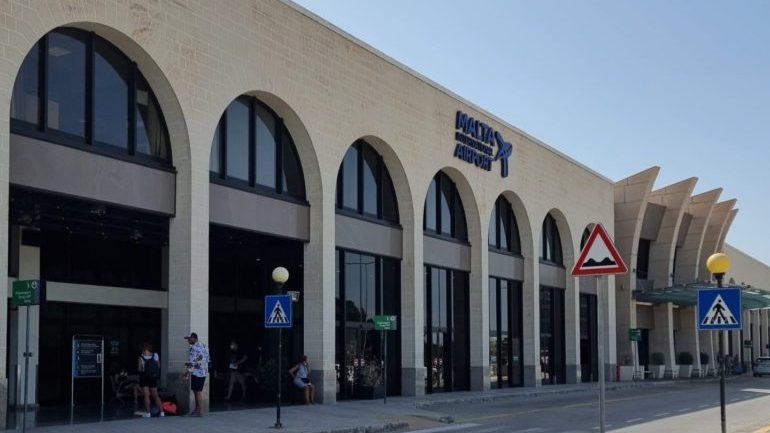
Best Time to Visit Malta
It depends on what year’s season suits you best and what you are searching for. Malta is a Mediterranean country, and the sea strongly influences the climate. It is hot, dry, and sunny in the summer, with cooling sea breezes sometimes. Spring and autumn are colder, and winters are mild. The high season can last until mid-to-late October. You can swim in the sea till the ‘winter’ months (people swim in the sea even in November and April). April, May, and June are suitable for good weather, beating the high tourist season between July and September with temperatures of 30+ C.
So, you need only a ticket and are ready for sunny days, beautiful views, and leisure walks through the old cities. Of course, you can come during the high season for your summer holiday. You will have a great time on the beach, exploring the island, or partying all night in the party center – Paceville.
Planning a Trip to Malta
Traveling to Malta by Plane
Before letting you know how to get around Malta, let’s see how you can get to this beautiful island. Malta is just a few hours away from most mainland European cities. It has excellent intercontinental connections and is very easily accessible. Many European carriers have seasonal flights to Malta, but few airlines fly to Malta during the whole year. Ryanair, WizzAir, Air Malta, Easyjet, and Lufthansa are the biggest companies serving the island throughout the year. However, travelers from the United States need to connect to Malta from a bigger European airport. But just to remind you, book early for cheaper options or wait for ticket sales.
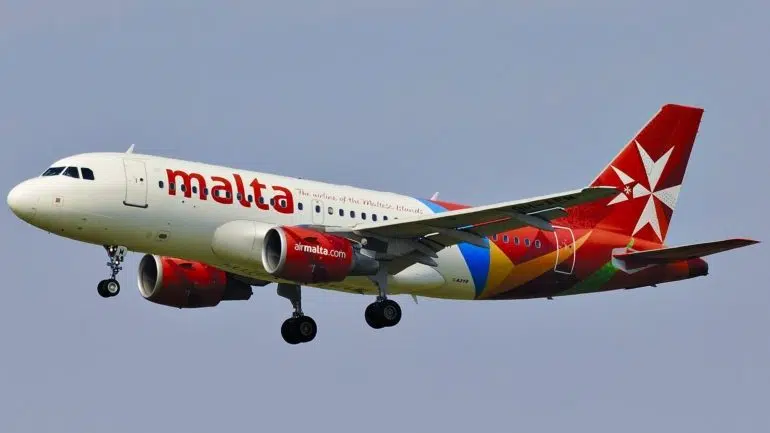
Traveling to Malta by Cruise Ship
Yes, it is an excellent option if you love sailing. Malta is in the Mediterranean, so many cruise ships stop at Malta, mainly around the Valletta Waterfront Cruise Terminal. The island is often a departure point for ships heading out to the Mediterranean Sea.
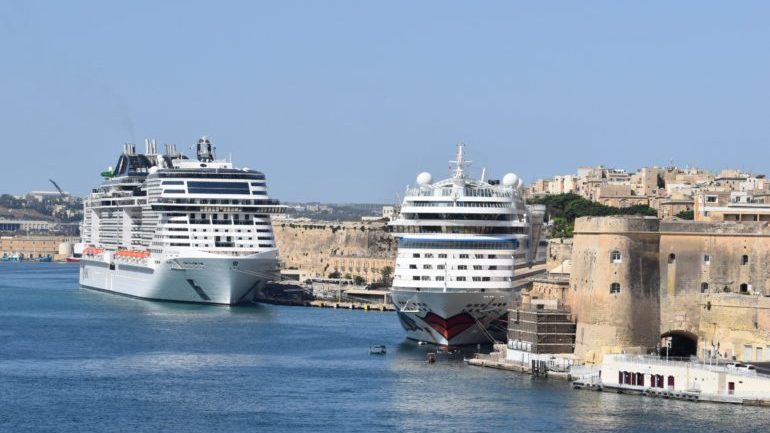
How to Get Around Malta
My First Trip
For my first trip, I admit, I needed to prepare better for how to get around Malta, but… When I was in Malta for the first time, I landed at Luqa Airport in the afternoon and went to the bus station in front of the airport. Many people were there, and I couldn’t get the first bus. So, I waited about half an hour for the next one. Meanwhile, the weather got colder, it began to blow, and the sky got darker… the storm was coming. When I took the bus, it was already raining heavily, it was dark, and I stopped at the wrong bus station. From there, I walked to my accommodation for about 20 minutes. I got very wet because the umbrella didn’t save me from the heavy rain. It was not a good start for a vacation (but all other days, the weather was pretty warm and sunny and perfect for walks to look around).
Because of my rainy accident in Malta, I recommend you check the weather forecast first and decide which transport is best for the season and you.
Different Ways to Get Around Malta
So, here are some tips on how to get around Malta—which way to travel on the island suits you best, and which will you choose? Let’s see.
Getting around Malta is a breeze, thanks to its well-connected public transport system and compact size. The island’s efficient bus network covers most major attractions, making it easy to explore places like Valletta, Mdina, and the Blue Grotto without the hassle of renting a car. For more flexibility, renting a scooter or car is a popular option, especially for visiting remote beaches and rural areas. If you’re feeling adventurous, ferries between Malta, Gozo, and Comino offer stunning views of the Mediterranean. For a more luxurious experience, you can book a private boat tour to discover Malta’s hidden coves and crystal-clear waters.
Rent a Car: If You Are a Brave Explorer
I haven’t used this option to get around Malta because driving is on the left, and I find it challenging to drive on this side of the road. However, it is an excellent option to get to the island’s remoter beaches. International driving licenses are legal in Malta. Leading global brands and local car hires offer daily rates of €20 – €50.
But be careful – the Maltese are not good drivers, and many tourists also have problems with driving on the left. Traffic accidents are not rare here (I would say the people here accept the traffic signs as recommended and not obligatory). You could also expect heavy traffic on the roads around Valletta, Sliema, and St. Julian’s, especially during rush hours. Also, finding a parking place in these tourist spots can be difficult if you rent a car. While car parks are available, it isn’t easy to find parking in the high season. But still, this is the best way to get around Malta and explore the island.
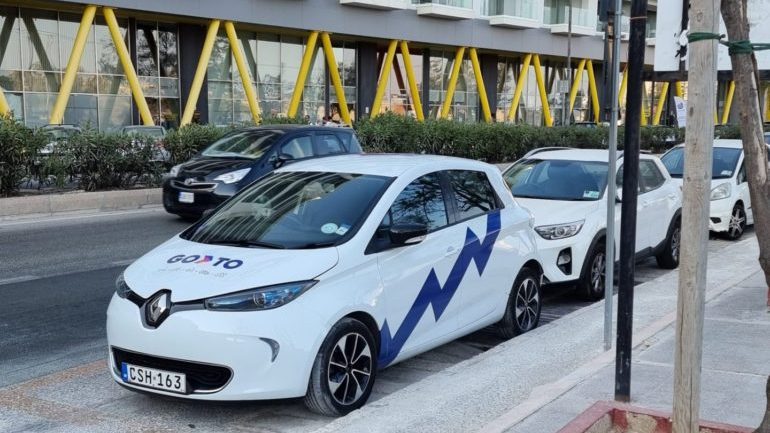
Public Transport: Cheap and Convenient
It is my way of getting around Malta, and I usually use public transport to get to every part of the island. Buses are relatively efficient in serving the major tourist areas and places of interest around the island. The central bus station is in front of the city gates of Malta’s capital, Valletta. Other main bus stations are at the airport, Bugibba, Sliema, Cirkewwa (the Malta terminal for the ferry to Gozo), and Gozo’s capital, Victoria.
Reaching the airport in Malta by bus is very straightforward, thanks to six express lines designated X1, X1A, X1B, X2, X3, and X4. The central bus station is Valletta, and you can get to every point of the island by bus. You can buy tickets at Malta Public Transport sales offices or directly from the bus driver. The ticket is 2.50 EUR, valid for 2 hours. There are also travel cards specially designed for visitors – the ExplorePlusMeep card, the Explore cards, and the 12 Single Day Journey card.
You could also use hop-on/hop-off buses with different routes around the island. Their routes cover all the significant sites in Malta and Gozo. Below, you can see the old Maltese buses now operating as part of the classic vintage tours from the capital, Valletta, to St. Julian’s.
But I skip them and just use the public bus to get around Malta (or walk if it’s a short distance)
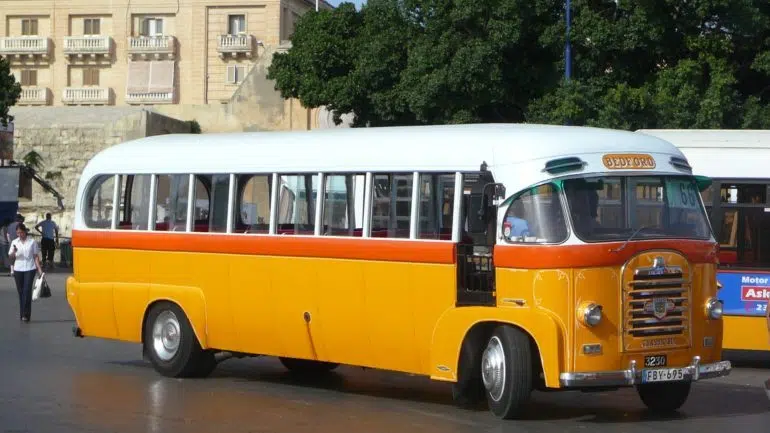
Taxi: Not My First Choice
Using taxis to get around Malta is not a good idea. Official Maltese taxis are white with a taxi sign on the roof. But they are too expensive. I recommend asking and agreeing on a fare before you enter the taxi, or better yet, choosing another option.
Bolt: A Better “Taxi” Option
Bolt is really a good option for traveling, especially if you are traveling with more people and could split the ride. You choose your destination, and in a few minutes, the driver comes. The cars are usually new, and the ride doesn’t cost much—you see how much it is when you choose your destination and the vehicle you prefer. (Recommended—you will see that most people here use this transportation to travel around Malta.)
Similar to Bolt is eCabs or Uber.
So, just download their apps and start your trip.
Other Options to Travel Around Malta
For getting around the island, you could also use:
– A bike
Cycling on Maltese roads can be challenging and annoying because the streets are often narrow, there’s lots of traffic, and drivers show little tolerance for cyclists. You could rent it at some points in public places or special shops. The landscapes offer sea or country views, but few people use a bike in Malta. It is more famous for tourists in Gozo.
You can rent bikes from Eco Bikes or The Cyclist Bike Shop. In addition, you could use the convenient pick-up/drop-off service for bicycles Nextbike around the main tourist destinations in Malta.
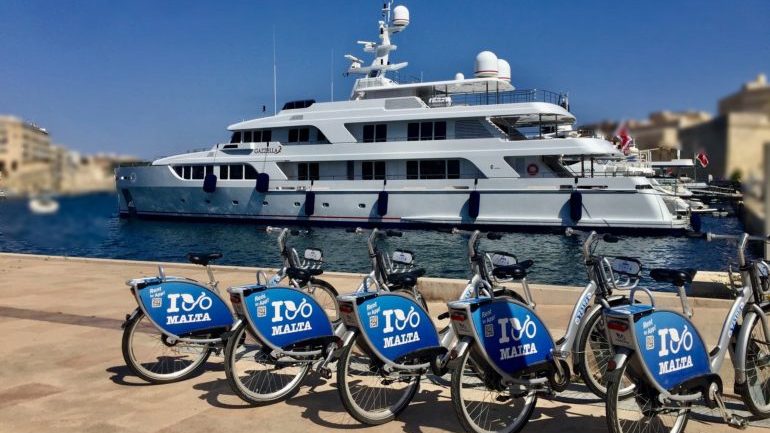
– Ferry/water taxi between Malta, Gozo, and Comino
There are different options for traveling from Malta and Gozo to Comino – you could check them in my post related to Blue Lagoon and Comino.
Between Malta and Gozo, you can use the Gozo ferry at a standard price of 4.65 EUR, and the crossing time is about 25 minutes.
Between Valletta and the Three Cities – Vittoriosa, Cospicua, Senglea, and Valletta and Sliema – the Valletta ferry has a standard price of 2.00 EUR and a crossing time of about 15 minutes.
Between Valletta and Gozo, take the Gozo Fast ferry, which has a standard price of 7.50 EUR and a 45-minute crossing time. I recommend buying the tickets online rather than at the last minute—it will be cheaper.
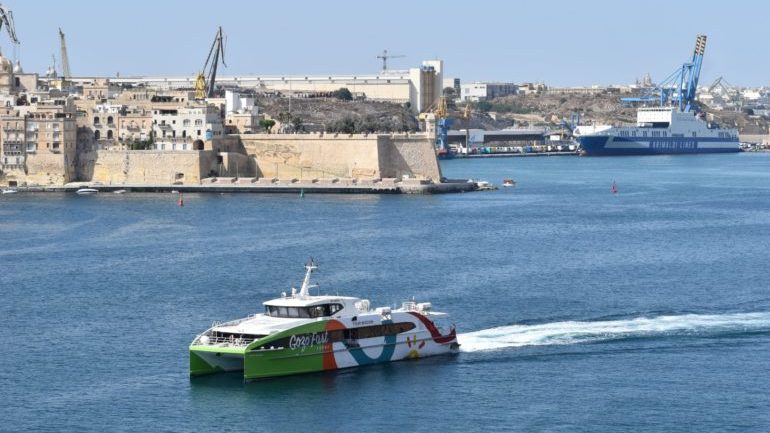
Where to Stay in Malta
The options are numerous and varied. On Booking, you can see plenty of hotels of different categories. There are farmhouses and villas, mainly in Gozo. In addition, there are self-catering apartments, guesthouses, and hostels. During the high season, June to September, accommodation prices could be significantly higher. So, I recommend booking in advance – 3-6 months if possible. For example, a night in a 4-5-star hotel is about 100-200 EUR per night; the cheaper hotels are from 40-50 EUR. (For the first time in Malta, I stayed in an apartment booked on Airbnb in Pieta (170 EUR for 4 nights, but I booked it a week before the trip in November).
Below are the best beaches in Malta. Would you like to book accommodation near one of them?
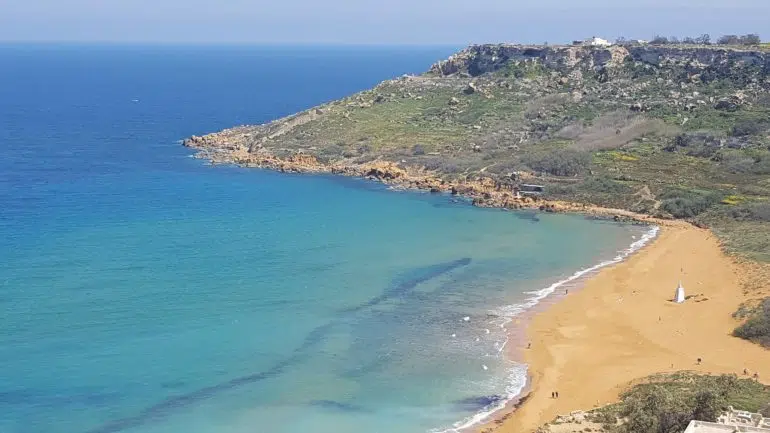
The Best Booking Resources
Below are my favorite companies to use when traveling. When you plan your next trip, I recommend using them. They offer the best deals, customer service, and values. When booking a flight, hotel, tour, train, or meeting people, they are always my starting websites.
Skyscanner – Skyscanner is one of my favorite flight search engines. They always offer good deals.
Momondo – This is another favorite search engine. Check both when planning your trips.
Airbnb—I love using Airbnb. It is a great accommodation alternative for connecting with people who rent their homes. There are plenty of options with reasonable prices, especially in big cities. I usually use them to find the apartments that suit me the best.
Booking.com – The best booking site that provides the cheapest rates. I always check them to find affordable rates out there.
Hostelworld – This is the best hostel accommodation site, with lots of options to choose from.
World Nomads – has excellent customer service, competitive prices, and great coverage.
Rome2Rio—This website allows you to see how to get from point A to point B, including bus, train, plane, and boat routes and their costs.
Malta offers a variety of convenient and scenic ways to get around, whether you prefer the affordability and ease of public transport, the independence of renting a car or scooter, or the unique experience of exploring by boat. No matter your travel style, navigating Malta is straightforward and enhances your journey through its rich history and beautiful landscapes. Plan ahead, and you’ll be able to make the most of your time on this charming Mediterranean island.
Inspired? Pin it for later!
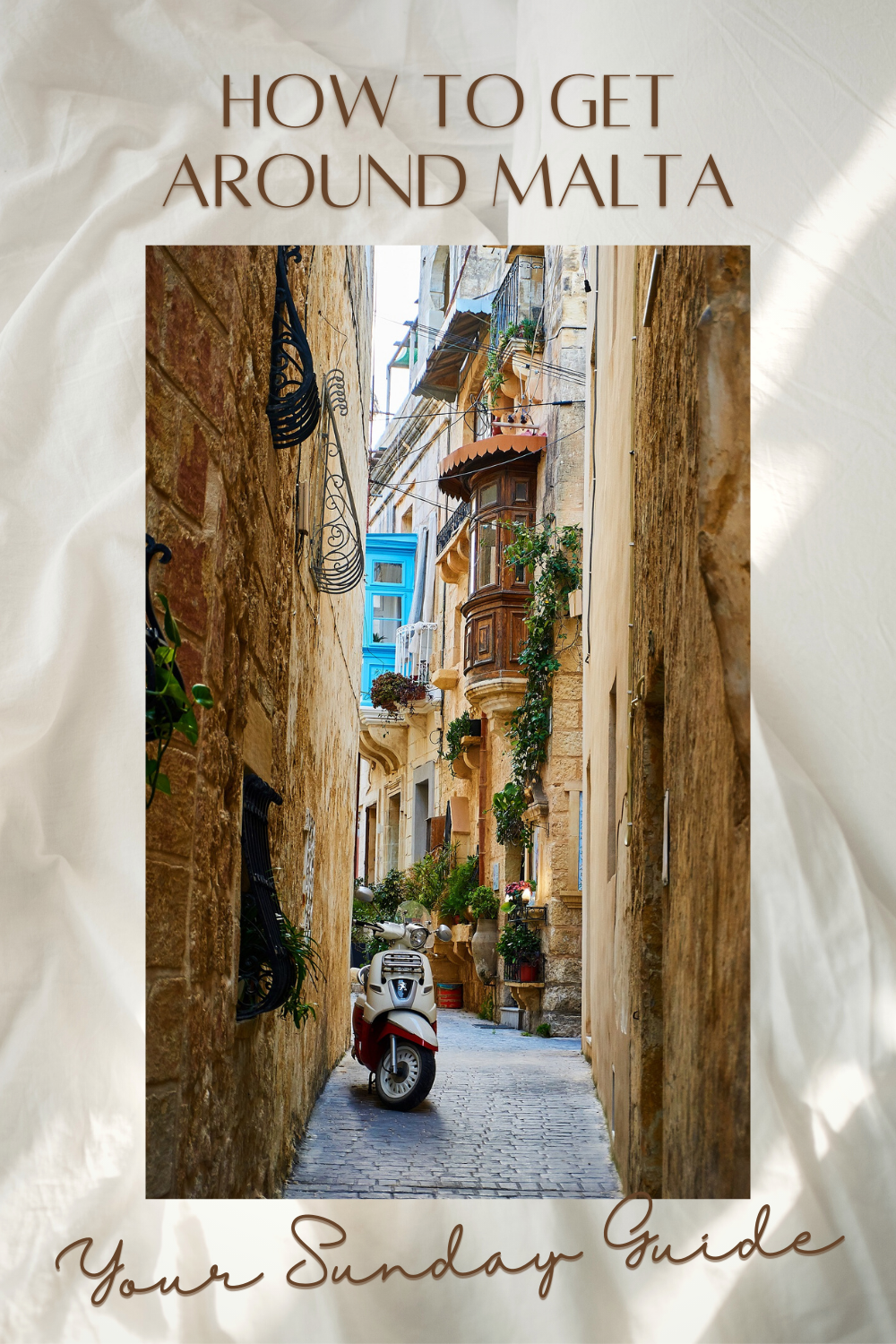
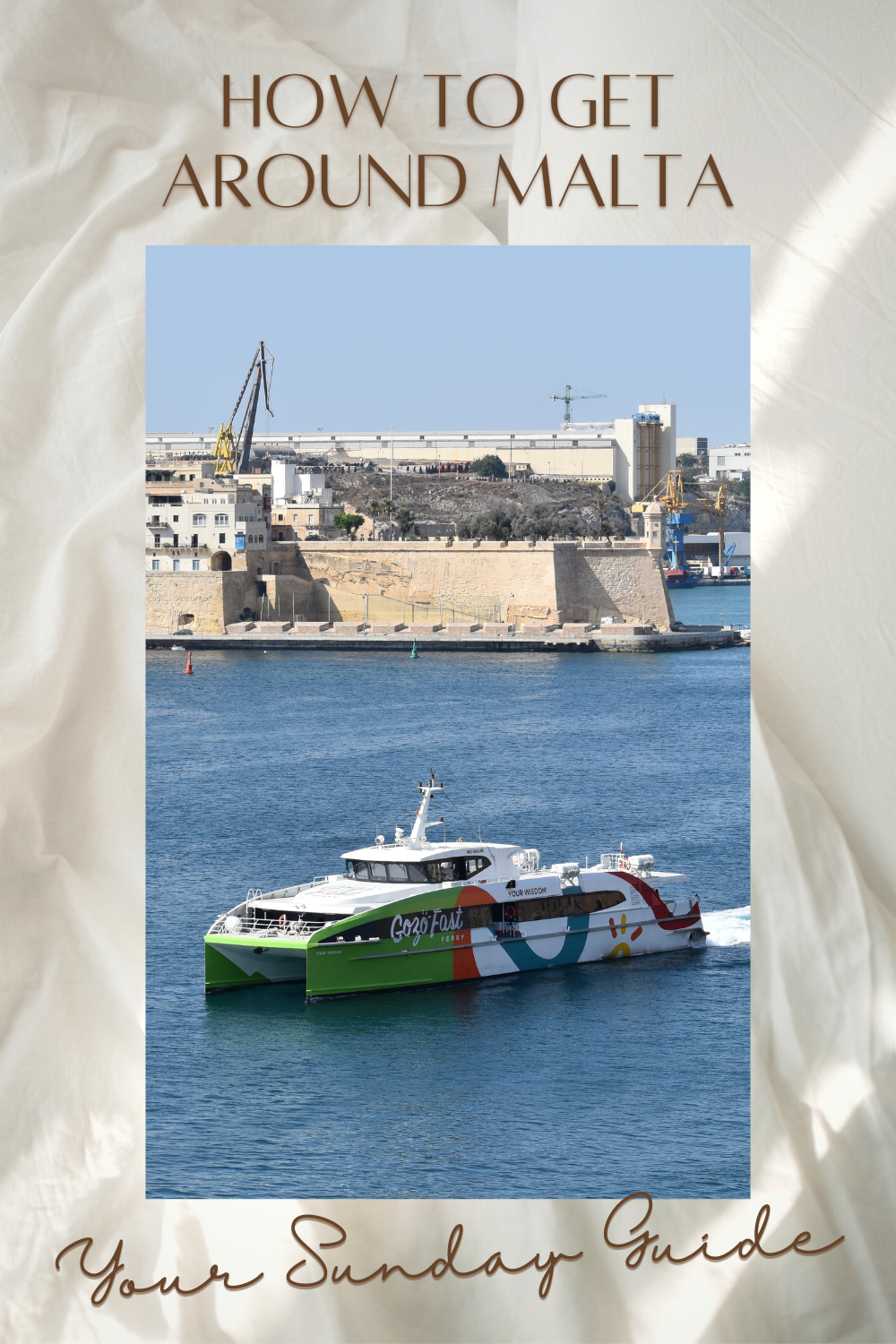

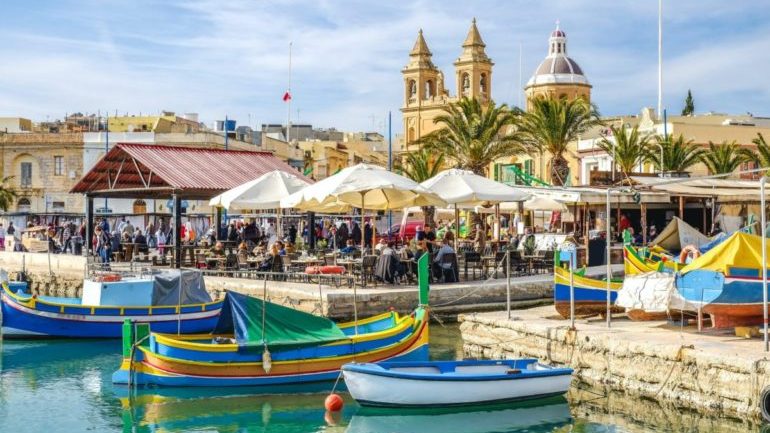
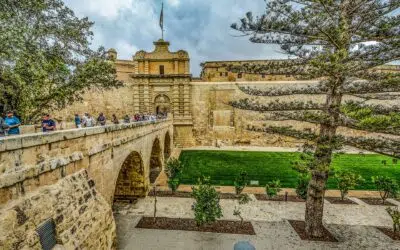
![San Anton Gardens – the most beautiful botanical garden in Malta [2024]](https://yoursundayguide.com/wp-content/uploads/2021/10/San-Anton-Gardens-1-400x250.jpg)
![What to See in The Three Cities of Malta [2024]](https://yoursundayguide.com/wp-content/uploads/2021/09/American-University-of-Malta-scaled-e1631984602288-400x250.jpg)
![What to do in Ta’ Xbiex (Malta) – All you need to know [2024]](https://yoursundayguide.com/wp-content/uploads/2021/08/YSG_0064-min-scaled-e1630144813980-400x250.jpg)
![Blue Lagoon, Malta: All You Need To Know [Complete Guide 2024]](https://yoursundayguide.com/wp-content/uploads/2021/08/comino-blue-lagoon-view-e1628777770133-400x250.jpg.webp)
![The Best Beaches in Malta: The Ultimate Guide [2024]](https://yoursundayguide.com/wp-content/uploads/2020/09/golden-bay-400x250.jpg.webp)
0 Comments